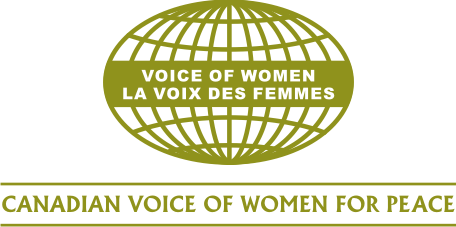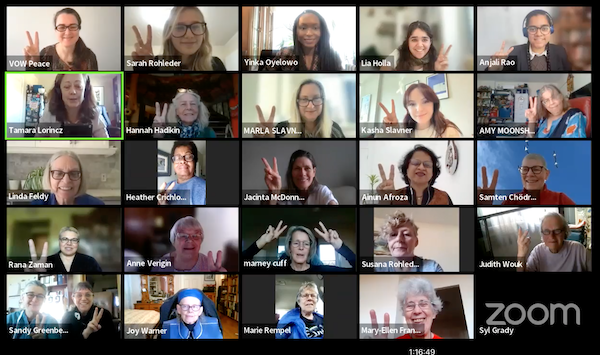By Anjali Rao, VOW Student Intern —
Last Saturday, October 29, the Canadian Voice of Women for Peace (VOW) hosted its Youth Panel and Annual General Meeting to gather members from all across the country to check in on our movement. Over Zoom, we had the pleasure of hearing from our exceptional youth panel, many VOW members, and the VOW board. The event was an inspiring meeting of women, united by their passion to stop nuclearization and promote disarmament.
The Youth Panel on “Peace, Disarmament and Climate Justice: Action for a Better World” featured four young Canadian women including myself. I was so moved to hear from Kasha Sequoia Slavner, Sarah Rohleder, and Lia Holla — these young women have done so much already to further the cause of peace in the world and going out of their way to champion what they believe in. Each spoke about their activism work in the field: Kasha worked to create the film 1.5 Degrees of Peace, Sarah has volunteered with a number of anti-nuclear organizations and attended the Treaty on the Prohibition of Nuclear Weapons (TPNW) conference in Vienna last year, and Lia is the executive coordinator of the IPPNWC. Strikingly, these women spoke about the importance of involving the youth in disarmament through education, accessibility, and activism. Lia spoke stirringly about her early exposure to VOW as a high school student and how the conversations she had at that time changed the trajectory of her life. My major takeaway from this panel was the importance of events like this in shaping the future.
This event also helped me clarify what is meant by feminist peace. The panel spoke on the intersection of climate justice, land rights, development, and gender. As we try to move policy in Canada towards disarmament, we need to keep these dimensions in mind. During the panel, Kasha spoke about her film, highlighting the effect climate has on our future and the destabilizing anti-peace impact ignoring this issue would bring. While it is important to move strongly behind a singular issue, it is equally important to avoid creating a silo around nuclearization. As Sarah pointed out, intersectional acknowledgment of nuclear weapons means not just considering the political impacts, but also the damage to our way of life and the death of animals and the environment.
Today, Canada has a lot of work left to do to ensure a peaceful world. Canada has yet to sign the TPNW, unacceptably, we are ranked 13th in the world for military spending, while we have yet to meet our climate targets, and Canada is planning on purchasing new fighter jets that would have not only devastating military capabilities but the potential to be used in nuclear conflict. It was also pointed out that US vessels frequent Canadian waters and owing to their policy of not confirming or denying the presence of nuclear weapons, might be harbouring these instruments. Our intergenerational conversation allowed for a discussion on many of these points, and renewed enthusiasm to counter this reality through VOW’s work.
As an internship student placed at VOW, I am coming to this organization with much less activism experience and knowledge about Canada’s relationship with war. My presentation broadly traced Canada’s nuclear history and my understanding of peace building, I was most startled to learn about Canada’s continued implicit endorsement of nuclear weapons. I am providing my presentation slides here for viewing. I have learned so much during this semester from both Sarah and Tamara Lorincz, our supervisor and extraordinary peace leader. I hope to continue contributing to VOW and similar movements outside of the scope of my university placement — it is so crucial that we fight to end all war in the world, and that begins with holding our government accountable for their support of nuclear weapons through NATO, their lack of climate change policy, their emphasis on defence spending at the cost of social services and climate justice, and other anti-peace actions.

